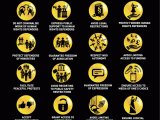South Caucasus Network of Human Rights Defenders
Support, empower and protect human rights defenders

[19.03.2014]
In March 2013, the Human Rights Council adopted a resolution on the protection of human rights defenders. It establishes principles and standards for States to create an enabling environment for human rights defenders. One year after its adoption, the Human Rights House Network calls upon States to implement this resolution.
Monday, 17 March 2014, by Human Rights House Foundation (HRHF)
Laws should not criminalise or delegitimise the work and activities of human rights defenders, and their right to enjoy universal human rights, states the resolution 22/6 adopted on 21 March 2013 by the United Nations Human Rights Council on the protection of human rights defenders. It adds that States should include information on steps taken to create a safe and enabling environment for human rights defenders in their communications to the international community.
One year later, the Human Rights House Network published a visual interpretation of the resolution, highlighting 20 principles which States should abide by to support, empower and protect human rights defenders.
Urgent need to address the use of legislation to hinder work of human rights defenders
From the expression of support to human rights defenders to guaranteeing freedom of association, States need to take concrete measures in practice and in law to create an environment in which working as a human rights defenders does not mean a threat for one's security.
Indeed, the Human Rights Council highlighted that there is an “urgent need to address, and to take concrete steps to prevent and stop, the use of legislation to hinder or limit unduly the ability of human rights defenders to exercise their work, including by reviewing and, where necessary, amending relevant legislation and its implementation in order to ensure compliance with international human rights law.”
Avoid limiting access to funding
The limitation of access to foreign funding is, in the last few years, a trend against which the Human Rights House Network is working. Developping from the Russian Federation and Belarus, other States such as Armenia and Azerbaijan are indeed following the same direction.
The Human Rights Council however clearly that laws shall not impose restrictions on potential sources of funding to human rights activities, other than those ordinarily laid down for any activity unrelated to human rights to ensure transparency and accountability. Hence, no law should crim- inalise or delegitimise human rights activities based on the geographic origin of funding.
Təqvim
Arxiv
|
||||||||||||||||||||||||||||||||||||||||||
|

